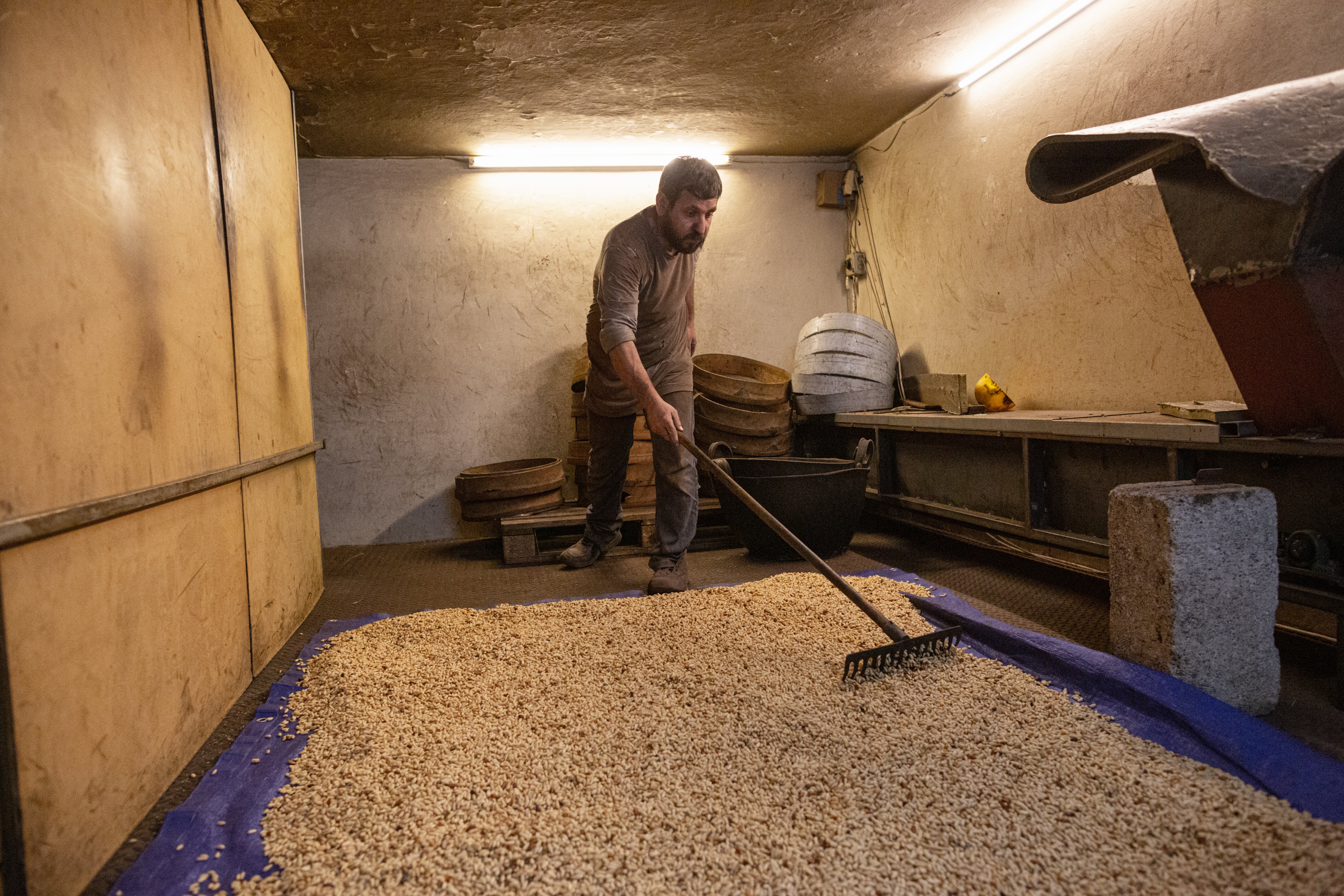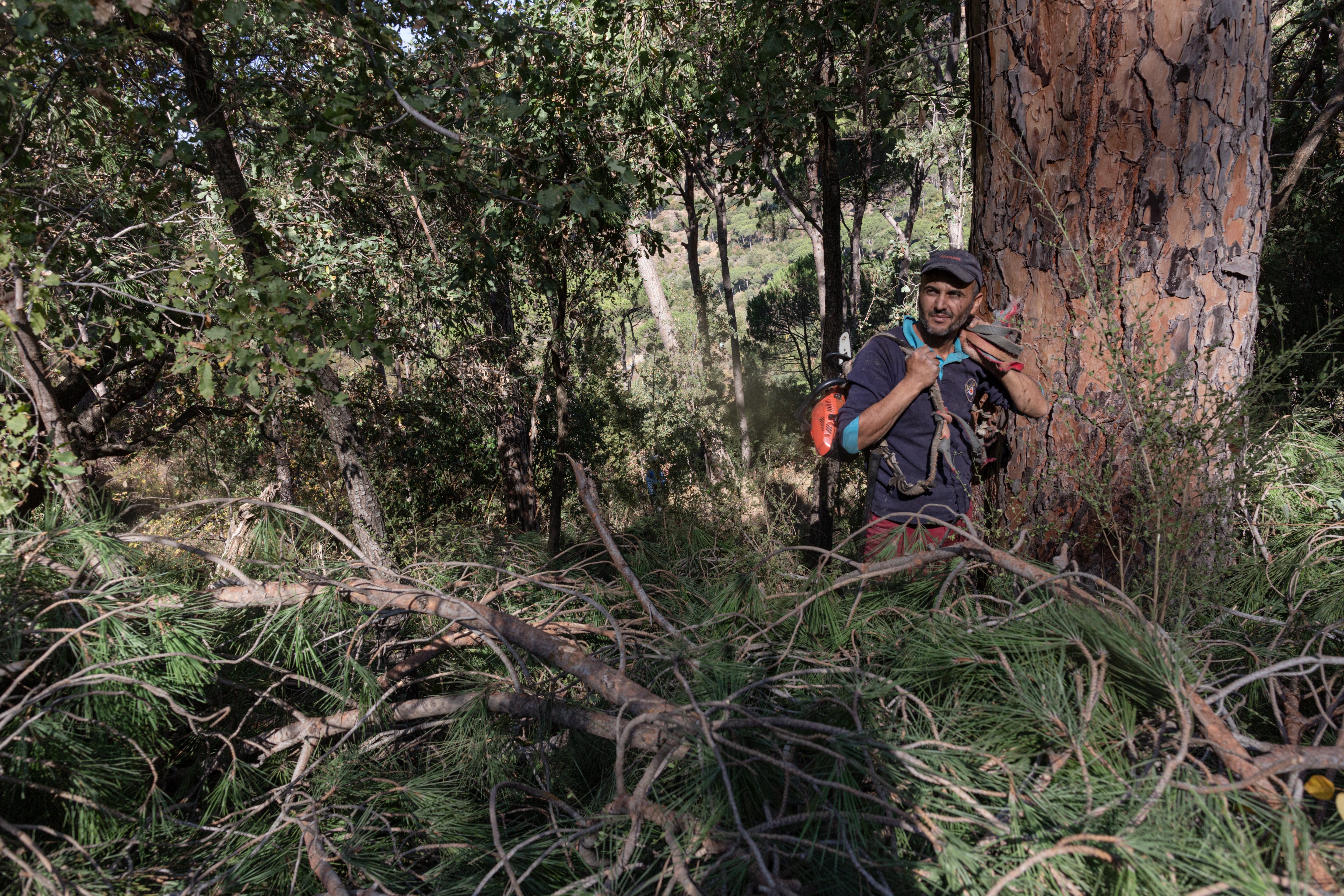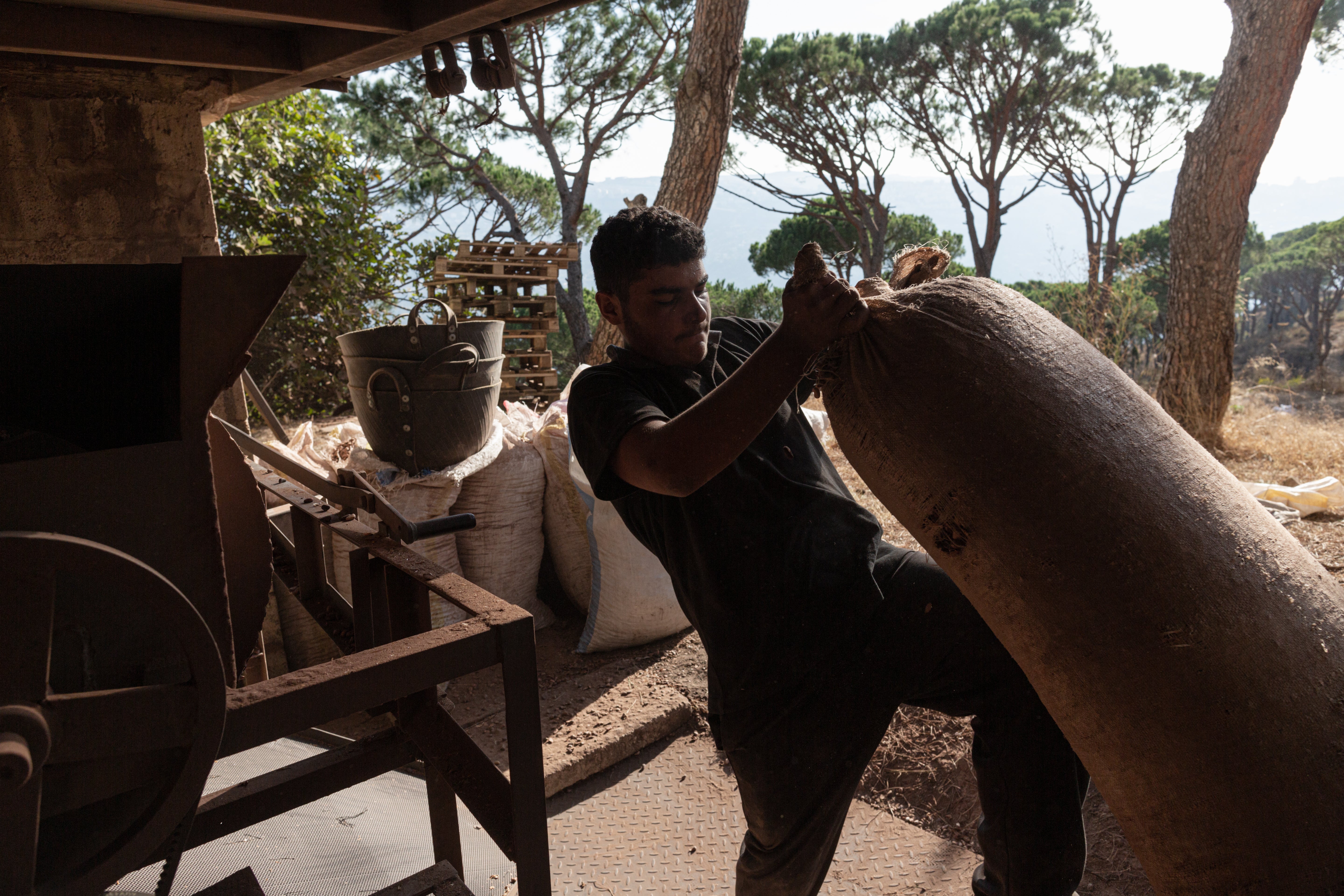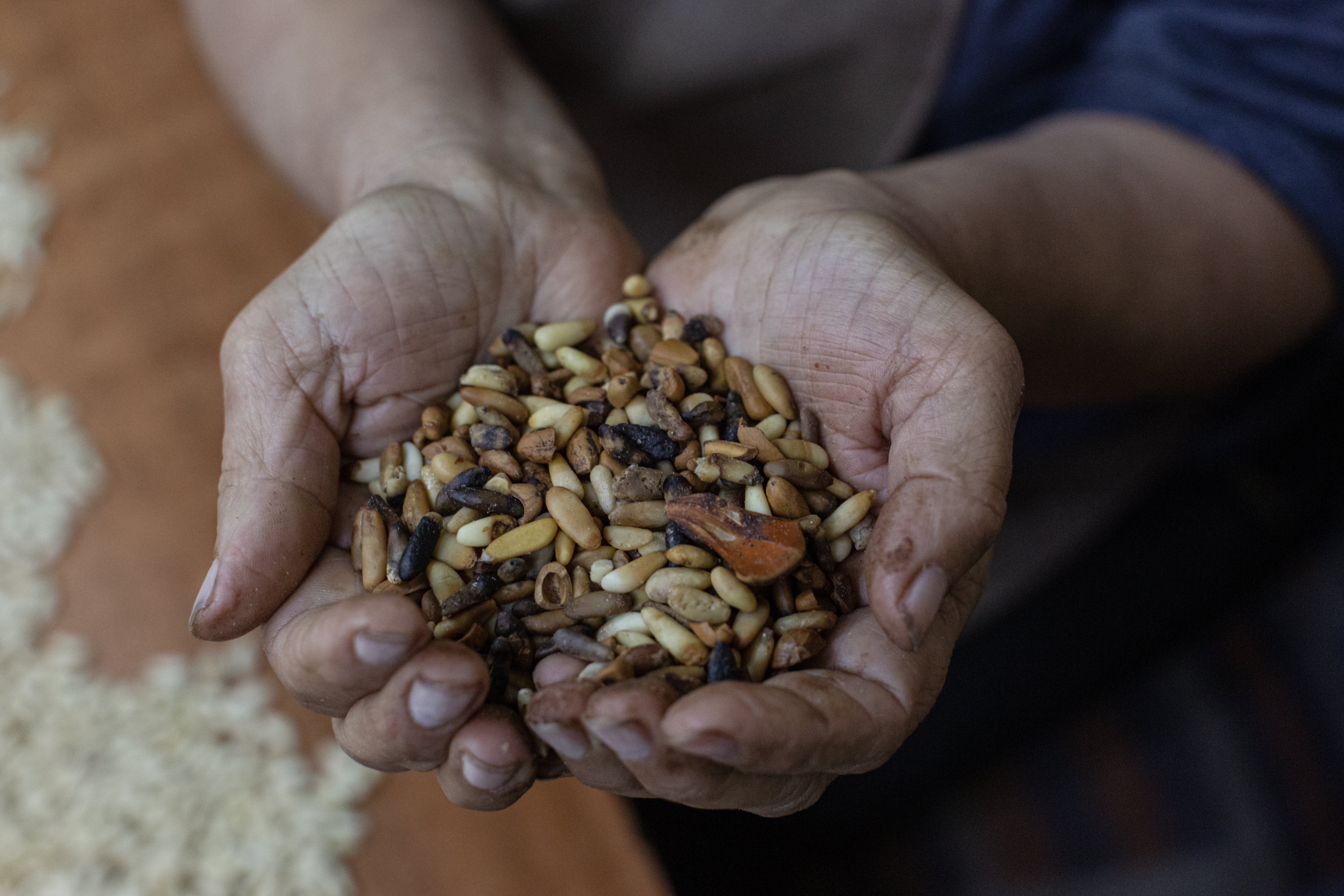Lebanon’s farmers fear losing ‘white gold’ as pests ravage pine nut trade
Pine seed production supports roughly five per cent of Lebanon’s population but farmers fear the industry could be wiped out within decades, report Sam Tarling and Sahar Albashir in Mtein Valley

Your support helps us to tell the story
This election is still a dead heat, according to most polls. In a fight with such wafer-thin margins, we need reporters on the ground talking to the people Trump and Harris are courting. Your support allows us to keep sending journalists to the story.
The Independent is trusted by 27 million Americans from across the entire political spectrum every month. Unlike many other quality news outlets, we choose not to lock you out of our reporting and analysis with paywalls. But quality journalism must still be paid for.
Help us keep bring these critical stories to light. Your support makes all the difference.
As the soft winter sun spills through the pine forest in the hills above Beirut, Omar Ghazar holds out a chapped and calloused palm.
There lies a fresh, soft pine seed, the type that might garnish a dish of hummus in the country's best restaurants.
Beside it is the brown husk of a withered, stunted seed: the calling card of an invasive sap-sucking insect that has almost entirely ended pine seed production in Lebanon.
The annual pine seed harvest used to be worth around $85 million, supporting as many as 70,000 families, according to Elias Naihmeh, head of the country's Pine Seed Farmers Syndicate.
This year, Naihmeh expects pine seed production to tumble to just ten per cent of former yields.
"No one is waiting to harvest their crop this season because, as you see, there is barely a cone or two on the tree. It's not like before. When we used to harvest, we could barely see the soil as it was fully covered by cones,” Naihmeh said.
The country's pine forests have been ravaged by the arrival of two pests: the pine shoot beetle - which dries out trees, currently affecting roughly just one in one-thousand trees thanks to a system of locally produced traps - and the western conifer seed bug, which feeds on young pine cones, blighting their seeds.
The only recourse available against the conifer seed bug is pesticide sprayed from helicopters, which Naihmeh said the Lebanese government can no longer afford to deliver.
"In the current situation, you can't rely on the state.”
Coming as Lebanon endures what the World Bank has described as one of the "most severe crises episodes globally since the mid-nineteenth century," the failing harvests have hit pine seed farmers hard.

"If you're a daily worker, you're the most impacted as the wages are lower and now everything is more expensive," said Ghazar, who, aged 51, has spent the last 35 years making his living from Lebanon's famed "white gold".
Ghazal descends the trunk of a four-story-high pine tree with nothing but a long cutting hook and an impeccable sense of balance to keep him from plunging to the forest floor.
The grace of the veteran picker belies the difficulty of this task; it takes two years of training before farmers can tackle the tallest trees. Accordingly, it had always been a reasonably well-paid job.
Ghazar said that his old daily wage of $60-$80 allowed him to send his children to private school - a relatively common occurrence among the middle class in Lebanon, where public schools have a poor reputation.
But that was before the Lebanese currency lost 90 per cent of its value due to the country’s deep economic crisis.
The cost of living soared as wages plummeted. Now the pickers are paid in Lebanese Lira at a black-market equivalent of just $25 per day.
"Whatever we make today we have to pay for generator bills or food," said Shukri Yahiya, a soft mannered 36-year-old from Syria, as he and his small group of friends drink tea on the forest floor, waiting for a stiff breeze to settle before returning to the trees.
"It's not just that there are fewer days of work, but the amount of effort it takes to gather a day's harvest is far harder. We have to climb thirty trees a day when before it was ten," he added.
The insects' effects are felt twofold: there are fewer cones on the trees while those that do grow are often lacking seeds.

Entomology expert Nabil Nemer blamed the bugs' proliferation on warmer winters and urbanisation.
"With the increasing impact of climate change, these insects are increasing greatly," he said. "Instead of reproducing a generation or two, it is reproducing three generations a year. Which means the damage is increasing."
"If we weren’t impacted so much by the changing climate, this bug might have just disappeared. The cold weather we used to have killed all the insects and bugs affecting the forests."
Road building and urbanisation around the forests have also raised temperatures. "The asphalt reflects the sun rays and increases the heat. That affects the surrounding trees and makes them more prone to insects and diseases," said Nemer.
The western conifer seed bug, Leptoglossus occidentalis, originated from Northern America. Arriving in Italy in 1999 to devastating effect, Leptoglossus' destructive march around the Mediterranean basin is thought to have reached Lebanon about a decade ago.
So far, no one has come up with an effective strategy to stop its damage.
"We are still working to find a solution. But Italy, Spain, and Turkey still couldn’t find one," said Nemer, who fears that the infestation could lead to a permanent shift in the demography of Lebanon's forests.
"Lebanon is a country of oak and not pine trees. Before we started to plant pine trees, our landscapes were covered with oak forests."
"It’s possible that oaks will replace pine trees in fifty years," he warned.
Naihmeh of the farmers’ syndicate fears that Lebanon's pine trees could disappear far sooner than that.
"The farmers rely on these trees to earn their living,” he said. “When they become unfruitful, the farmers will use them as firewood. We are facing a huge crisis."

Like all crops, pine seeds are the source of a cascade of different businesses, all of which are now under threat.
"Pine seeds are the economic pillar of the mountain," said Naihmeh, before reeling off a list of all those who benefit from the crop: Land owning farmers; those who farm rented lands; the workers they employ; the landowners from whom they rent; those who work in the processing and distribution of pine seeds.
Including these people and all their dependents, Naimeh said the industry supports roughly five per cent of Lebanon's population.
The desperation is clear at a processing plant in the next valley, where pine cones from the surrounding forests are brought to have their valuable seeds extracted.
"Of course, we're worried about the future," said 50-year-old Khaled Riad al-Sheikh.
He has been working in the industry for twelve years. Two years ago, he brought his then 15-year-old son to work alongside him. But he fears that the business, and indeed the rural way of life, may not survive much longer.
"Climate change is affecting all agriculture," he said.
"Five years ago, we didn't worry about anything because work was continuous, but now it's three days on, two days off. The days we work, we eat. The days we don't, we have nothing."



Join our commenting forum
Join thought-provoking conversations, follow other Independent readers and see their replies
Comments